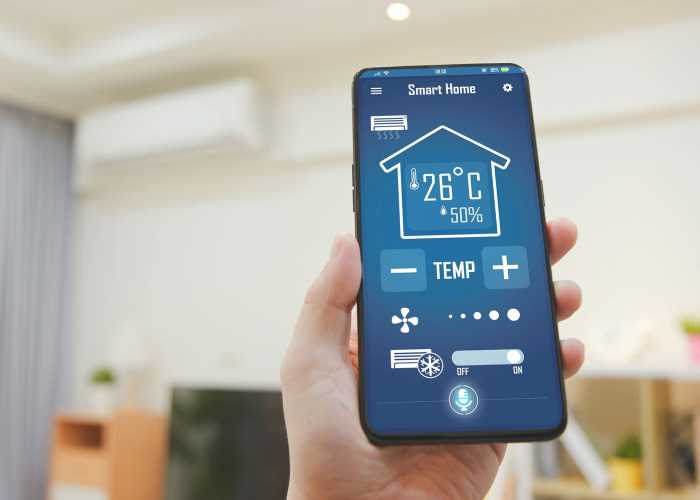Smart home devices are transforming the way we live - from enhancing security to automating daily tasks - and smart air conditioning is no different.
But what exactly is this climate control technology and how does it work?
Smart air conditioning refers to the integration of cutting-edge technologies into traditional HVAC (heating, ventilation, and air conditioning) systems.
This advanced form of home AC allows you to remotely manage and automate your climate control settings through the use of connected devices, such as smartphones, tablets, smart home hubs and even your smart watch.
Smart air conditioning also goes beyond basic cooling and heating functions, with features that allow for more precise and efficient cooling while offering the convenience of remote management.
Smart air conditioning uses a combination of technology and connectivity to give you greater control of your home temperature settings:

Temperature and humidity sensors: smart AC units are equipped with sensors that constantly monitor the temperature and humidity levels in the environment. These sensors provide real-time data to the system, allowing it to make informed decisions about how to adjust the climate settings for optimal comfort and energy efficiency.
Wi-Fi connectivity: this is a key part of smart air conditioning. It enables the AC unit to connect to your home network, allowing communication with other connected devices.
Mobile apps and smart home platforms: thanks to the Wi-Fi connectivity, you can control your smart AC units through dedicated mobile applications on your smartphone or tablet. Smart air conditioning systems also often integrate with popular smart home platforms, such as Google Home or Amazon Alexa, allowing you to manage your AC units using voice commands or centralised control hubs.
One of the fundamental features of smart air conditioning is of course remote control functionality. This means you can adjust temperature settings, turn the unit on or off, and monitor the system status from anywhere with an internet connection.
Beyond this, these systems can include a range of smart features such as:
Weekly scheduling: you can create weekly schedules that match your daily routines, automating the operation of your smart AC units around your lifestyle.
Smart modes: these systems often come with predefined modes tailored for different scenarios like "Sleep Mode" for nighttime comfort or "Eco Mode" for energy efficiency.
Filter replacement alerts: some systems may provide regular prompts to clean or replace filters, helping to maintain optimal performance and air quality.
Geolocation tracking: advanced smart AC systems may incorporate geolocation tracking, which detects when you’re approaching home and adjusts the temperature accordingly.
Adaptive learning: some units employ adaptive learning algorithms which means that, over time, the system learns your preferences and habits.
Multi-zone control: for homes with multiple zones or rooms, some smart AC systems offer multi-zone control, providing customised comfort throughout all your living living spaces.
Convenience is one of the biggest benefits of smart air conditioning. Whether you’re out and about or at home on the sofa, the ability to control temperature with a few taps or a simple voice command is a big draw.
But there are other benefits besides convenience:

Energy saving: smart AC systems dynamically adjust performance, ensuring optimal efficiency and reducing unnecessary energy consumption compared to traditional units.
Maintenance reminders: smart ACs offer built-in reminders for tasks like filter replacements or system inspections. These proactive notifications help you stay on top of maintenance, extending the system's lifespan and preventing potential issues.
Error diagnosis: some smart ACs can perform real-time diagnostics to detect and analyse issues. This allows for quicker resolution and minimises downtime.
Usage data: smart ACs generate usage data, offering insights into system operation and energy consumption so you can make better decisions about your cooling habits.
The easiest way to make an existing air conditioner smart is by installing a smart thermostat that's compatible with your system.
Depending on the thermostat you choose, this will provide you with many of the benefits of a fully fledged smart air conditioner, without the associated cost.
If you’re looking for a full upgrade or wanting to install a system from scratch, our qualified engineers are on hand to offer expert advice.
